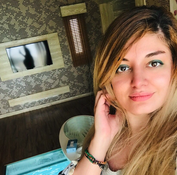|
Her name is Ghazaleh Kashi, and she lives in Tehran, the capital of Iran. Her first name is the Persian word for a beautiful animal; can you guess what animal that might be? In the following 13-minute videotaped interview, Ghazaleh herself will pronounce and explain her name for us. She will also share a few details and thoughts about herself, her family, her culture, her growing up years, and her current life in Iran. Ghazaleh thanks you for your attention and interest! If after the interview you have any questions or comments for her, please feel free to enter them in the “Comments” section that follows the video.
Ghazaleh, we thank you [Kheilee mamnoon] for being the second person to take part in this interview series! P.S. A final detail: Ghazaleh’s husband, Meysam Ahmadi, is both a video editor and creator by profession and has added his signature touches to this videotaped interview of his wife! We thank Meysam for the significant contributions of his love and time to make sharing this interview with us possible. We look forward to next month’s interview, when Meysam himself will be our guest!
31 Comments
(or, “What’s in a Name?”)  In my last blogpost, I introduced you to Rokhsareh Yassi, my niece (daughter of my husband’s sister in the photo) who lives in Saveh, Iran. During my video-taped interview with her (in English), she said, “I like to call Iranian people ‘Persian people’—the old name of us.” So, for those of us who may still wonder what the difference is between “Iranian people” and “Persian people,” what does her statement mean?
Answer: Both “Iranian” and “Persian” are legitimate terms, and both terms are related—but not everyone considers them interchangeable. The term “Iranians,” quite simply, refers to all people who are native to Iran. That said, there are many different ethnic or tribal groups within the country. The largest and probably best-known group is the Persian Iranians. Their heritage can be traced back to the original inhabitants of the ancient Persian empire (of which modern-day Iran occupies a central portion. For this reason, some Iranians refer to Iran as “Persia,” and prefer to be called “Persians,” like Rokhsareh.) But there are also Azeri Iranians, Golaki Iranians, Kurdish Iranians, and several other Iranian groups in the country. So, in terms of ethnicity, not all Iranians can be said to be Persian. But again, when Rokhsareh said she prefers to call the people of Iran “Persian people,” she is referring to her country’s historical and geographical ties to Persia, and to the inhabitants of Iran by extension. At the same time, it is very important to note that there are many people who identify as Persian who are from other central Asian countries, including Afghanistan, Tajikistan, Uzbekistan, and the Persian Gulf States. But, returning our focus to the people of Iran and what to call them, it can also be said that because of the longtime political tensions between Iran and America, some Iranians are tempted to identify themselves as “Persian” rather than “Iranian” to their non-Iranian contacts. They do so just to avoid dealing with the negative press often associated with “Iranians.” Popular Iranian American comedian Maz Jobrani explains it in his own words in the following comic routine: https://youtube.com/clip/Ugkxm8WVKtdSAyr2XCWHAYw11a-VEkp3AqEE Another point of confusion that comes up frequently is the question, What is Iran’s national language—the language most Iranians speak, that is. Do they speak “Farsi,” do they speak “Persian,” do they speak “Iranian” perhaps, or do they speak something else?
Bottom line: When speaking in their native language, most Iranians will say they speak Farsi. When speaking in English, however, people should say that Iranians speak “Persian.” To say, “People from Iran speak Farsi” (rather than “Persian”) can be compared to saying, “People from Spain speak español” (rather than “Spanish.”) That is why Rokhsareh referred to her language as “Persian” while communicating in English. The above points are “fun facts” for language nerds like me! At the same time, perhaps the information will come in handy at some point. But for now, the terminology lesson is over! And if I may, allow me to remind you to keep an eye out for this month’s new videotaped interview, which I will send you via email. Thank you! |
AuthorDr. Leslie Ahmadi discovered her intercultural calling in her parents’ home at age four--where between the jazz, the spirituals, and the rock ‘n roll music, she heard folk songs in languages from around the world. Thirty years later she had a doctorate in foreign language and culture education--and her folk song guitar never far away. Archives
July 2024
Categories |

 RSS Feed
RSS Feed